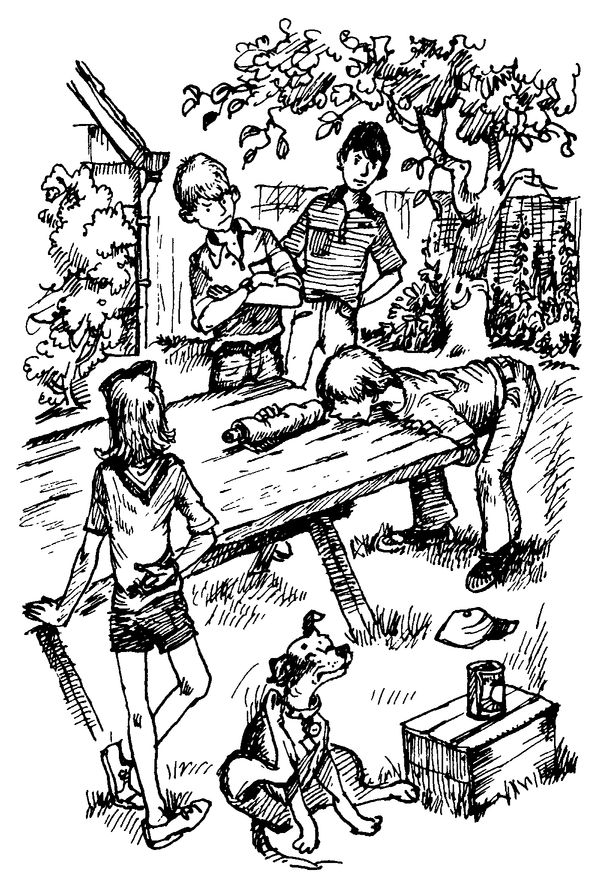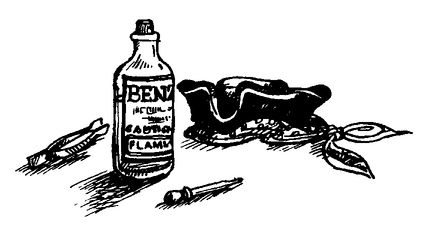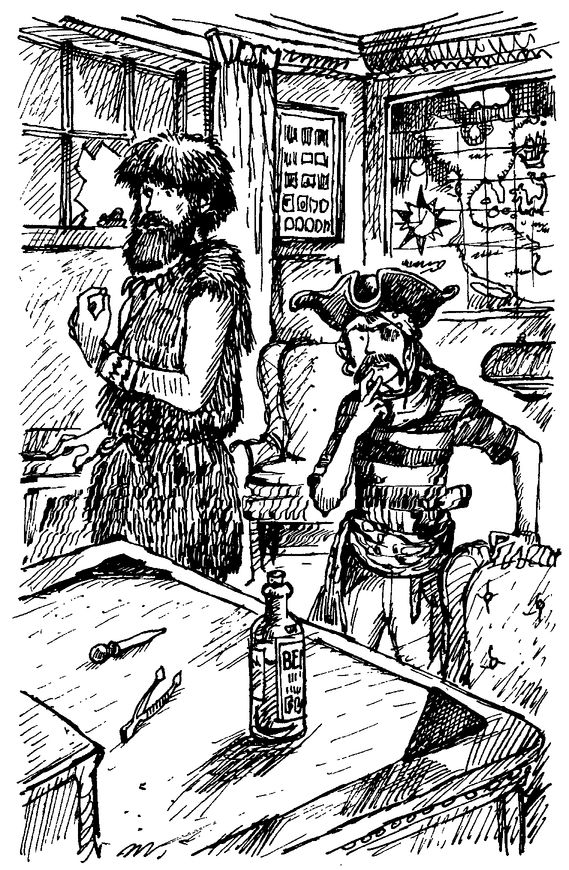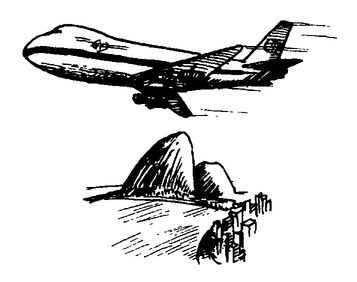Encyclopedia Brown and Dead Eagles (5 page)
Read Encyclopedia Brown and Dead Eagles Online
Authors: Donald J. Sobol

BOOK: Encyclopedia Brown and Dead Eagles
12.13Mb size Format: txt, pdf, ePub
“How do I know?” complained Thad. “I can’t see a thing.”
Hoager fixed Thad with the eye of a shark. “Don’t talk about missing the action, friend,” he warned. “I’ll describe it to you.”
“S-s-s-sure, H-Hoager,” Thad agreed. “S-sure.”
Hoager squinted into the tube. “Will you look at that little rascal go!”
For a few minutes Hoager kept up a running account of the worm’s efforts within the covered tube. Twice he plugged the open end with his thumb. This, he explained, was to keep Lightfoot Louie from falling out while making a turn.
Eventually, Hoager grew weary of describing Lightfoot Louie’s progress. He fell silent.
Minute after minute dragged by. Thad could stand it no longer.
“Where is he now?” he asked.
“Making his turn at the far end,” Hoager reported. “Talk about smooth... unbelievable!”

Hoager squinted into the tube. “Will you look at that
little rascal go!”
little rascal go!”
“Unbelievable says it all,” grumbled Sally.
“He’s on the last lap now,” cried Hoager. “Here he comes... Wow! What a finish! Fantastic!”
He pulled Lightfoot Louie from the open end. “This little speed merchant breezed into the championship race,” he said. “Isn’t that correct, Mr. Timekeeper?”
“You
breezed into the championship all right,” said Sally. “For liars!”
breezed into the championship all right,” said Sally. “For liars!”
“Nobody calls me a liar,” growled Hoager.
He swung at Sally’s chin and went “Oooof!” Sally had landed a left to his stomach. He swung again and went
thud!
Sally had dumped him on his pants with an uppercut.
thud!
Sally had dumped him on his pants with an uppercut.
All at once she looked worried. She turned to Encyclopedia.
“You can prove that he made up the whole race, can’t you?” she said.
“Of course,” said the detective.
WHAT WAS THE PROOF?
(Turn to page 93 for the solution to The Case of Lightfoot Louie.)

The Case of the Broken Window
It was eight thirty at night when John Hall telephoned Chief Brown.
Fifteen minutes later Encyclopedia and his father were driving to Mr. Hall’s house. Encyclopedia wore his Halloween pirate’s costume. Chief Brown was dressed as a caveman.
“Mr. Hall is giving a costume party tonight,” said Chief Brown. “That’s the reason for our dressing up. He doesn’t want his guests alarmed by the sight of the police.”
“What happened?” asked Encyclopedia. He had been too excited at going along on a grown-up case to ask questions before now.
“Someone, perhaps a guest, stole a valuable stamp,” answered Chief Brown.
Mr. Hall had the largest stamp collection in Idaville. Some of his stamps were worth thousands of dollars.
He was waiting outside his house when Encyclopedia and Chief Brown drove up at quarter past nine.
The two men shook hands, and Chief Brown said, “This is my son Leroy. I hope you don’t mind that I brought him.”
“Your son?” exclaimed Mr. Hall. “Why, I thought he was a real pirate!”
Encyclopedia gritted his teeth and followed the men into the house. They walked past groups of costumed guests and up a flight of stairs.
“In here,” said Mr. Hall, entering his study. The room’s one window was unlocked. The glass was shattered.
Mr. Hall stopped by the desk, on which lay a stamp album. In a calm voice he told what had happened.
At seven o‘clock he had taken the stamp album from the wall safe to enjoy it. At eight o’clock the first guest had arrived, and he had gone downstairs. He had locked the door and window, but had left the album out on the desk.
Shortly after eight thirty, he had gone back upstairs to put the album in the safe. He had found the door unlocked and the window broken.
“So far as I can tell at the moment, the only thing missing is the Louis Guinea, a French stamp worth ten thousand dollars,” he said.
“The thief probably first sneaked up the stairs and found the door locked,” said Chief Brown. “So he went into the backyard and climbed that little tree and broke in. It was already dark, and so he was pretty sure no one would see him. He stole the stamp and left by unlocking the door from the inside.”
“I quite agree,” said Mr. Hall. “The tree is small and shaky. The thief must have decided there was less risk in leaving the room by the staircase.”
“That makes him a guest—someone in costume,” said Chief Brown. “If he had been questioned on the stairs, he could always say that he had heard a noise and came upstairs to investigate. Has anyone left the party?”
“No, I checked,” said Mr. Hall. “All the guests are still here. The thief won’t dare call attention to himself by leaving early.”
“There is no point to searching everyone,” said Chief Brown. “If the thief got wind of a search, he would get rid of the stamp in a second.”
“Or worse, destroy it rather than be caught,” said Mr. Hall. “That’s why I asked you to wear a costume. You can do your work without drawing attention.”
Mr. Hall replaced the stamp album in the wall safe.
“I haven’t moved anything but the album,” he said. “Now, please excuse me. I must rejoin my guests.”
After he had gone, Encyclopedia walked to the desk. It was bare except for a pair of tweezers and a bottle of benzine with an eyedropper for finding watermarks. A quartz lamp stood behind the desk chair.
“Leroy, over here,” called Chief Brown.
He held up a tiny bit of curved glass. It had fallen among the flat window glass on the carpet.
“It could be from an eyeglass lens,” he said. “The thief might have broken his glasses getting into the room.”
“Then we better look for a man wearing broken eyeglasses,” said Encyclopedia. “Or, if he’s taken them off, for someone who squints and bumps into things.”
Father and son went downstairs. They decided to separate and meet in the kitchen in half an hour.
Encyclopedia moved slowly among the many colorfully costumed men and women.

“Leroy, over here,” called Chief Brown. He held up a
tiny bit of curved glass.
tiny bit of curved glass.
A floppy horse brushed past him. “The man in the rear could have glasses on, broken or not,” thought Encyclopedia. “But how to find out?”
A man dressed as the great detective Sherlock Holmes—with a deerstalker cap, magnifying glass, and pipe—was reading a poem to a ballerina.
He was reading, however, without the help of eyeglasses or the magnifying glass, and it was the ballerina who squinted.
“No, she’s just fluttering her eyelashes,” Encyclopedia realized when he moved closer.
A Humpty-Dumpty sat on a chair and peered through blinking red eyes.
“He’s just tipsy,” Encyclopedia decided as Humpty-Dumpty fell off his chair. He lay on the floor snoring.
At the end of half an hour, the boy detective had seen no one with broken eyeglasses or a squint. He headed to the kitchen. On the way he sidestepped a masked man in a cowboy outfit.
Chief Brown was waiting by the stove. “I hope you did better than I,” he said. “I struck out.”
“Struck ... that’s it, Dad!” exclaimed Encyclopedia. “That bit of curved glass wasn’t from an eyeglass lens at all!”
WHAT DID ENCYCLOPEDIA MEAN?
(Turn to page 94 for the solution to The Case of the Broken Window.)

The Case of the Gasoline Pill
Twinkletoes Willis was Idaville’s greatest child track star.
Eight years ago he had run a 50-yard dash, and the country had taken notice. His time, 22.1 seconds, had set an American record for boys under two years of age.
Ever since then, Twinkletoes seldom walked if he could run. When he came into the Brown Detective Agency, however, he wasn’t running. He was limping.
“My left foot is killing me,” he groaned.
“Maybe you have a hole in your shoe,” said Sally.
“Naw, the hole is in my right shoe,” replied Twinkletoes. “I’ve got my money roll in my left, and is it making my toes sore!”
“You’ve found a new way of footing your bills,” remarked Encyclopedia. “How come?”
Twinkletoes explained. Half an hour ago he had gone to Mr. Arronzi’s shoemaker’s shop to have the hole fixed. But Mr. Arronzi was so busy that he couldn’t start new work for two days.
“While I was there,” said Twinkletoes, “Wilford Wiggins walked in.”
“Oh, oh,” said Encyclopedia.
Wilford Wiggins was a high school dropout and as lazy as a curbstone. His mother wasn’t sure how tall he was. She hardly ever saw him standing up.
Wilford spent his time lying in bed and dreaming up get-rich-quick ideas. At least once a week, Encyclopedia had to stop him from cheating the children of the neighborhood.
“What was Wilford doing at the shoemaker’s?” asked Sally. “He’s so seldom on his feet.”
“He left a pair of boots. They needed heels,” said Twinkletoes. “He was surprised to see me.”
“Why?” asked Sally.
“Wilford thought I’d be at the city dump,” replied Twinkletoes. “He’s called a secret meeting there for two o’clock. I hadn’t heard about it because I’ve been out of town.”
Encyclopedia nodded knowingly. “Wilford told you to race home and get all your money and bring it to the meeting.”
“Right,” said Twinkletoes. “I ran home and got my life savings—twelve dollars. Wilford has a new plan to make us little kids richer than millionaires.”
He laid a quarter on the gas can beside Encyclopedia.
“I stuck my money roll in my shoe to keep it safe, but it’s slowed me down,” he said. “I need a bodyguard.”
Encyclopedia returned the quarter. “No charge,” he said, “in a case involving Wilford.”
“I know Wilford is so crooked he can hide in the shadow of a wishbone,” said Twinkletoes. “But this time he may be on the up-and-up.”
Other books
Ebb Tide by Richard Woodman
SEAL Team Six: Memoirs of an Elite Navy SEAL Sniper by Howard E. Wasdin, Stephen Templin
The Race for Paris by Meg Waite Clayton
Comradely Greetings by Slavoj Zizek
Many Unpleasant Returns by Judith Alguire
Earthbound by Aprilynne Pike
Small-Town Cinderella (The Pirelli Brothers) by Stacy Connelly
Shoedog by George P. Pelecanos
Double Booked for Death by Ali Brandon
Unzipped: An Urban Erotic Tale by Noire